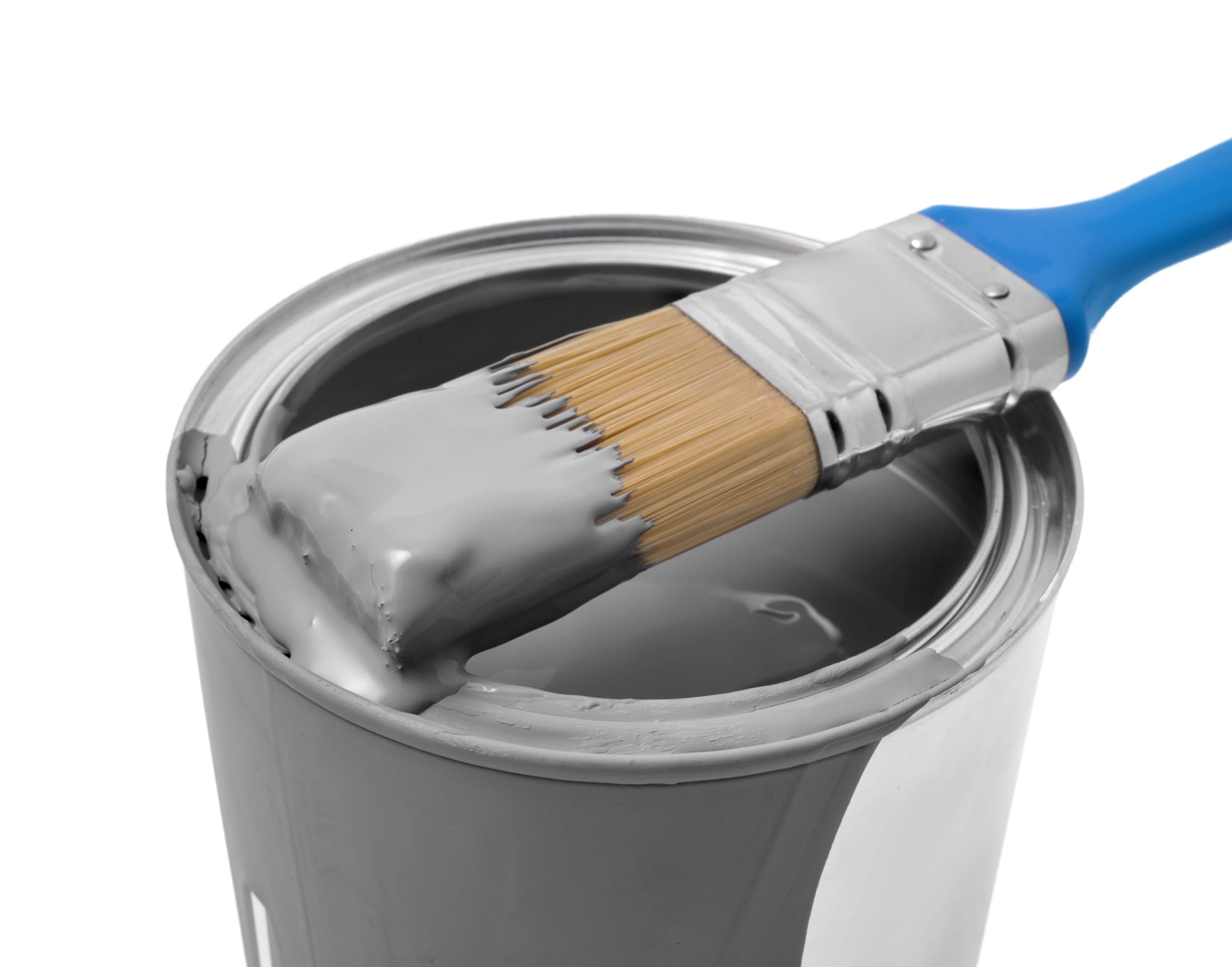The Benefits of Using Acrylic Paint for Exterior Surfaces

Key Features
- Durability Against Weather: Acrylic paint is highly durable and can expand and contract with changing weather conditions, preventing cracks and peeling.
- Water Resistance: Acrylic paint creates a solid barrier against moisture, protecting your home from mold, mildew, and rot, particularly in humid or rainy climates.
- Fade Resistance: Thanks to its UV-resistant properties, acrylic paint maintains its color longer, even in direct sunlight, making it ideal for homes in sunny areas.
Exterior Acrylic Paint
If you’re considering a fresh coat of paint for your home’s exterior, acrylic paint should be at the top of your list. As a painting contractor, I’ve worked with countless paint types, and acrylic stands out for its versatility, durability, and overall performance. Whether you're painting siding, trim, or even a deck, acrylic paint offers several benefits that make it ideal for exterior surfaces, especially in climates where weather can take a toll.
Let’s dive into the advantages of using acrylic paint and why it’s a smart investment for your home.
Durability That Stands Up to the Elements
One of the primary reasons homeowners choose acrylic paint for exterior surfaces is its outstanding durability. Unlike oil-based paints, which tend to crack and peel over time, acrylic paint remains flexible. This means it can expand and contract with changes in temperature, making it resistant to cracking in extreme weather conditions.
In areas where temperature fluctuations are common, such as the Pacific Northwest, acrylic paint is a superior choice. Its elasticity helps it hold up against the hot summer sun and the cold, wet winters, ensuring that your home’s exterior stays protected for longer periods.
Water Resistance for Wet Climates
If you live in a region that experiences frequent rainfall or high humidity, water resistance is a crucial factor in choosing an exterior paint. Acrylic paint is highly resistant to moisture, which helps prevent issues like mold, mildew, and rot. Once applied, acrylic forms a solid barrier against water, helping to protect your siding, trim, and other exterior surfaces from the elements.
This water resistance is especially important for wood siding, where moisture can seep in and cause damage. With acrylic paint, your home remains better protected against the risks of water damage, making it a great choice for rainy or humid climates.
Things to Know:
- Weather Resistance: Acrylic paint holds up well in both rainy and sunny climates, making it perfect for homes exposed to harsh weather conditions.
- Preparation Is Key: Proper surface cleaning and priming are essential to ensure the paint adheres correctly and provides maximum protection.
- Eco-Friendly Options: Many acrylic paints come in low-VOC or zero-VOC formulas, making them a safer and greener choice for your home.
- Versatile Application: Acrylic paint works on a variety of exterior surfaces, from wood and masonry to metal and concrete.
- Long-Term Savings: Though it may cost more upfront, the durability and longevity of acrylic paint reduce the need for frequent repainting, saving you money over time.
Fade Resistance for Long-Lasting Color
Another standout benefit of acrylic paint is its fade resistance. Homes painted with acrylic paint maintain their vibrant colors longer than those painted with oil-based or latex paints. This is because acrylic paint is formulated with UV-resistant properties that help prevent the color from fading due to sun exposure.
If your home is located in a sunny area or if you're painting high-exposure surfaces, like south-facing walls, the long-lasting color retention of acrylic paint will keep your home looking fresh and beautiful for years to come.
Quick Drying Time for Faster Completion
Acrylic paint is known for its relatively fast drying time compared to other types of paint. This is a huge advantage, especially when painting exterior surfaces, where you often need to account for weather conditions. Because acrylic dries quickly, you can apply multiple coats within a short timeframe, reducing the overall time it takes to complete a project.
Faster drying times also mean less downtime between coats, which can be particularly helpful if you’re racing against an incoming rainstorm or trying to finish a project before the cold season sets in.
Easy Application and Cleanup
One of the reasons I love working with acrylic paint is how easy it is to apply. Whether you’re using a brush, roller, or sprayer, acrylic paint goes on smoothly, providing excellent coverage in fewer coats. It's especially user-friendly for DIY homeowners who may not have extensive painting experience.
Additionally, because acrylic paint is water-based, it’s much easier to clean up compared to oil-based paints. Simply use soap and water to clean your brushes and equipment, making the whole process more convenient and less time-consuming.
Versatility for Multiple Exterior Surfaces
Acrylic paint isn’t just for siding; it’s versatile enough to be used on a wide range of exterior surfaces, including:
- Wood: Acrylic paint adheres well to wood and provides excellent protection against the elements.
- Masonry: Whether it’s brick, stone, or stucco, acrylic paint can be used to freshen up these surfaces with lasting results.
- Metal: If you're painting gutters, downspouts, or metal trim, acrylic paint's flexibility ensures it will adhere well without cracking or peeling.
- Concrete: For walkways, patios, or even garage floors, acrylic paint can provide a smooth, durable finish.
This versatility makes acrylic paint a great all-around choice for various surfaces, allowing you to maintain a cohesive look across your home’s exterior.
Environmentally Friendly Options
In recent years, the push toward more eco-friendly building materials has extended to paint products as well. Acrylic paint is considered one of the more environmentally friendly options on the market. Many acrylic paints are formulated with low or zero volatile organic compounds (VOCs), which reduces harmful emissions during the painting process.Not only does this make acrylic paint a healthier choice for your home’s occupants, but it also minimizes your impact on the environment.
In Our Experience:
"As a painting contractor, we’ve found that acrylic paint consistently outperforms other exterior paints in terms of durability, flexibility, and fade resistance. It’s particularly effective in climates where moisture and temperature changes can wreak havoc on traditional paints. The ease of application and quick drying time also make it a go-to for our exterior painting projects, saving both time and effort without compromising on quality."
Better Adhesion and Coverage
One of the main technical advantages of acrylic paint is its superior adhesion properties. It sticks well to almost any surface, ensuring long-lasting coverage without peeling or flaking. This is particularly important for older homes with weathered surfaces. Acrylic paint can be applied directly over a wide variety of substrates, including previously painted surfaces, wood, stucco, and masonry, providing excellent coverage and uniformity.
Acrylic paint is also known for its excellent opacity, meaning fewer coats are needed to achieve full coverage, saving you time and paint.
Cost-Effectiveness Over Time
While acrylic paint may come with a slightly higher upfront cost than some traditional options, its long-term benefits make it a cost-effective choice. Its durability and resistance to weather conditions mean you won’t have to repaint your home as frequently, reducing maintenance costs over time.
Additionally, because it adheres so well and offers excellent coverage, you may end up using less paint overall, further increasing its value in the long run.
Tips for Using Acrylic Paint on Exterior Surfaces
When it comes to applying acrylic paint, preparation is key. Here are a few tips to ensure the best results:
- Clean and prep the surface: Make sure all surfaces are clean and free of dirt, mildew, or loose paint before applying acrylic. This ensures proper adhesion and a smooth finish.
- Prime when necessary: If you’re painting over a porous surface or dealing with repairs, using a primer can help the acrylic paint adhere better and last longer.
- Consider the weather: Avoid painting in extreme temperatures—whether it's too hot or too cold. Acrylic paint performs best in moderate conditions, typically between 50°F and 85°F.
Final Thoughts on Acrylic Paint for Exterior Surfaces
Acrylic paint offers a wide range of benefits for exterior surfaces, from its durability and flexibility to its fade resistance and ease of application. Whether you're repainting your home or tackling a new project, choosing acrylic paint can help ensure that your exterior looks great and holds up well against the elements for years to come.
Do You Have Questions? Give Us A Call With Any & All! 503-389-5758
-
People Also Ask:
What are the benefits of using acrylic paint on exterior surfaces?
Acrylic paint provides excellent durability, water resistance, and fade resistance, making it ideal for exterior surfaces that need to withstand weather conditions like rain, humidity, and sun.
Is acrylic paint better than oil-based paint for exterior surfaces?
Yes, acrylic paint is more flexible than oil-based paint, allowing it to expand and contract with temperature changes, reducing the likelihood of cracking or peeling over time.
Can acrylic paint be used on wood and metal surfaces?
Absolutely. Acrylic paint adheres well to a variety of exterior surfaces, including wood, metal, stucco, and masonry, making it a versatile choice for home improvement projects.
-
SUBSCRIBE TO OUR BLOG: Stay informed with the latest in Painting and DIY projects by subscribing to Lightmen Painting. Get insights, tips, and more delivered straight to your inbox. We would also love to know what you would like to read about, leave thoughts on where we should go next. Interests, Topics, Ideas, all are welcome.
If your in the Portland, Or. area and need advice or a free no obligation estimate call us at 503-389-5758 or email scheduling@lightmenpainting.com
Shout Out:
Celebrating FOX 2 Now: Highlighting Excellence in Local Painting Services
From the team at Lightmen Painting, we extend our highest praise to FOX 2 Now for showcasing reputable local painting contractors like Fagan Painting. Just as we are committed to quality and professionalism in our painting services, FOX 2 Now helps homeowners connect with trusted professionals who consistently go above and beyond. Their dedication to promoting local excellence aligns perfectly with our mission to deliver top-tier painting solutions that enhance and beautify environments.
Thanks for stopping by Lightmen Daily! Stay tuned for more practical tips and expert advice on making your painting projects flawless, from wall to floor!
Definitions
- Acrylic Paint: A water-based paint known for its flexibility, durability, and ease of use, ideal for exterior surfaces due to its resistance to weather conditions.
- Water Resistance: The ability of paint to repel moisture and prevent water from penetrating surfaces, helping to protect against damage.
- UV Resistance: A characteristic of paint that helps prevent fading and deterioration caused by prolonged exposure to sunlight.
- Durability: The ability of a material, such as paint, to withstand wear, pressure, or damage, ensuring it lasts over time.
- Fade Resistance: The ability of paint to maintain its original color without fading, even when exposed to sunlight.
- Primer: A preparatory coating applied before painting to improve adhesion and enhance the longevity of the paint.
- Weather Resistance: The capacity of paint to withstand environmental conditions like rain, humidity, and temperature changes without losing its effectiveness.
- Opacity: The measure of how much light the paint blocks, impacting how many coats are needed for full coverage.
- Eco-Friendly: Refers to products that are less harmful to the environment, such as low-VOC acrylic paints.
- Flexibility: Acrylic paint's ability to expand and contract with the substrate, reducing the likelihood of cracking in extreme weather conditions.
Lightmen Painting Serving: Portland, Tigard, Lake Oswego, Tualatin, West Linn, Milwaukie, Sherwood, Happy Valley, Oregon City, Beaverton, Hillsboro, Gresham -Trade Partners-

